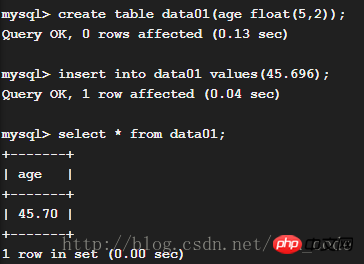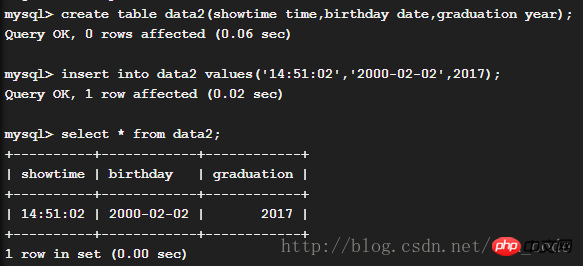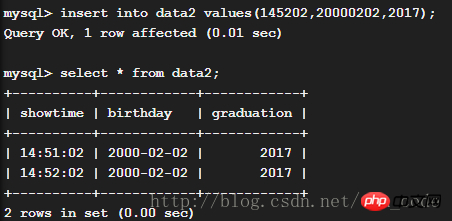
Numeric types are roughly divided into two categories: one is an integer, and the other is a floating point number or decimal.
The commonly used integer type is the int type, and the allowed range is between (-2147483648, 2147483648).
Commonly used types of floating point numbers or decimals are: float, double and decimal types.
float type (single-precision floating-point value);
double type (double-precision floating-point value);
decimal type (used in calculations that require very high accuracy;
these The type allows specifying the precision and counting method of the value as selection parameters. The precision here refers to the total number of significant digits saved for this value, and the counting method represents the number of digits after the decimal point)
Case: 设置age为单精度浮点型,当我们插入45.696,就会四舍五入; create table data01(age float(5,2)); insert into data01 values(45.696);//结果保留两位小数,四舍五入,结果为45.70

Commonly used string types are: char, varchar, text and blob types
char type: used for fixed-length characters Strings must be defined within parentheses with a size modifier that ranges from 0 to 255 and specifies the length of the value to be stored.
Varchar type: It is a variant of the char type, used for variable-length strings, and must also have a size indicator ranging from 0 to 255. The difference lies in the way MySQL handles this indicator. :char treats this size as the exact size of the value, while the varchar type treats it as the maximum size and only uses the number of bytes actually needed to store the string. So using this type is a good choice if you are not sure how many characters a field will store.
For relatively long strings, MySQL provides two types: text and blob. They have different subtypes according to the size of the data to be stored, which are used to store images, large text, and sound files. binary data. The difference is: blob types are case-sensitive, text types are not.
MySQL uses date and year types to describe simple date values, and uses the time type to describe time values. The values can be described as strings or sequences of integers without delimiters.
If described as a string,
Values of date type should be separated by hyphens as delimiters, values of time type should be separated by colons as delimiters, and values of year type must be separated by 4 For digital storage, MySQL will automatically convert: convert the values in the range of 00~69 to the range of 2000~2069, and convert the values in the range of 70~99 to the range of 1970~1999. For example:
Case: create table data2(showtime time,birthday date,graduation year); 001) insert into data2 values(‘14:51:02’,’2000-02-02’,2017);

002) insert into data2 values(145202,20000202,2017);
//The result is the same as (001)
In addition to date and time data types, MySQL also supports a hybrid type:
datetime and timestamp data types, which can store date and time as a single value component.
These two types are commonly used to automatically store timestamps containing the current date and time, and can come in handy for applications that perform a large number of database transactions and need to establish an audit trail for debugging and review purposes.
If the first field statement in a row is of type timestamp, and this field is not explicitly assigned a value or is assigned a null value, MySQL will automatically fill it with the current date and time.
Using MySQL's now() function to fill in the current date and time in the statement's datetime type field can get the same result.
Data classification can play an important role in making stored data more consistent and improving efficiency and speed. Therefore, the choice of data types is very important when designing a database, and all issues involved should be fully considered before making a choice from the multiple sets of options available with MySQL.
Listed below are several criteria that need to be kept in mind when selecting data types for MySQL:
Allowed values, the range and type of values allowed to be entered in a field determine which The data type is the most direct factor added to this field.
Storage efficiency, it is also important to consider the range of possible values for the field and select an appropriate and appropriately sized data type based on this range, especially when dealing with numeric types.
Format and display requirements, another important factor affecting the selection of field types is the application format and display requirements of the data stored in the field.
Data processing requirements, the selection of data types should also consider the requirements of data operations and application processing. For example, some types are more suitable for speeding up data operations than others.
Sort, index, and comparison requirements. If you want to sort all the values in a column by different criteria, then we need to choose a type that can perform these functions efficiently and with maximum flexibility. Adding an index to the corresponding field can speed up retrieval. The type of comparison should also be the data type used. It is necessary to ensure that the data types used support comparison operations and are compatible with each other.
The above is the detailed content of In-depth understanding of MySQL advanced drifting (1). For more information, please follow other related articles on the PHP Chinese website!




